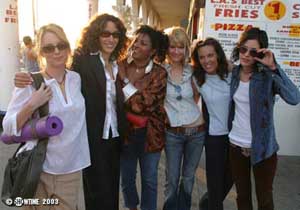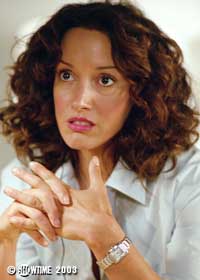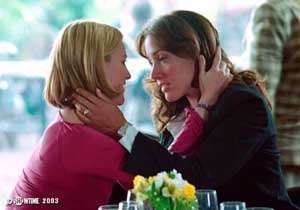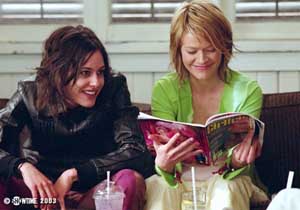-
- Bill targets willful spreading of HIV
- Conservatives split over amendment
- School district settles gay rights suit
- Dean cites religion in signing civil unions, never mentioned previously
- Future of Delaware gay rights bill rests with state Senate
- Gay marriage opponent apologizes for poll
- Vice President Dick Cheney says he would support ban on gay marriage
- Court says gay dad must ‘hide lifestyle’
- National News Briefs
- World News Briefs
Arts & Entertainment
More fabulous drama on Showtime
And this time, it’s lesbians
Published Thursday, 15-Jan-2004 in issue 838
“The L-Word,” a new television series about a group of twenty and thirty-something lesbians and their friends, premieres Sunday, Jan. 18, on Showtime, and it’s bound to make a big splash. The one-hour drama follows the lives of nine characters in Los Angeles as they navigate through daily upheavals, careers and romantic relationships — both gay and straight — and it’s highly addictive.
Starring Jennifer Beals, Erin Daniels, Leisha Hailey, Laurel Holloman, Mia Kirshner, Karina Lombard, Eric Mabius, Katherine Moennig and Pam Grier, “The L-Word” follows Jenny, a writer who has recently graduated college and moved to West Hollywood to live with her boyfriend, Tim, and their neighbors Bette and Tina, a lesbian couple who are looking to start a family despite their own struggling relationship. Bette and Tina have a close network of friends that include resident heartthrob Shane, closeted professional tennis player Dana, bisexual journalist Alice, and Bette’s half-sister Kit, a musician and recovering alcoholic.
The two-hour pilot episode, directed by Rose Troche (Go Fish, Bedrooms and Hallways — although this show surpasses both), introduces Bette and Tina as they search for the perfect sperm donor, and Jenny as she becomes intrigued by the beautiful Marina and begins to question her own sexual orientation.
Ilene Chaiken executive produced “The L-Word” through her company Posse Productions, along with Steve Golin and Larry Kennar. She also wrote the pilot episode of “The L-Word.”
The Gay and Lesbian Times spoke with Chaiken about the upcoming show before its popularity whisks her back into the production room for another season.
“It just struck me that it was great subject matter for television drama.” Gay and Lesbian Times: How did the idea for the show come about?
Ilene Chaiken: I think that I just had the urge to write a little bit about my own life. That said, about four years ago I wrote an article for Los Angeles Magazine about the advent of the gay and lesbian baby boom in Los Angeles. It was a time when every lesbian I knew was either adopting or having babies, or at least contemplating it, and as a lot of gay men were starting to do the same. I wrote this piece and I realized as I was writing it that it was much more anthropologically about my world and life experience. It just struck me that it was great subject matter for television drama. I’d never wanted to do television series writing before, but it just seemed so obvious that these were stories that hadn’t been told and that they suited the form.
GLT: It seems that this is the first show that primarily deals with lesbian, bisexual and transgender characters from a female perspective.
IC: I believe that it is. Certainly the first drama and the first ensemble show that talks about the lives of different women, most of whom are lesbians. There have been lesbian characters, and I think “Ellen” would be the only real example that featured a lesbian as its main character, but this is the first one that ever started out with that intention and is populated by [lesbian] characters.
GLT: Do you think that the show plays a major role in deconstructing stereotypical identities in the mainstream viewer’s mind or do you think it might reinforce them?
IC: I don’t really know the answer to that. It’s certainly the question that gets asked a whole lot in the reviewing and perceiving of the show, but from my point of view I’m just telling stories. I understand that popular culture has the potential to affect the zeitgeist in one way or another and my hope would be that it would be more the former — rather than reinforcing stereotypes I think that it will deconstruct them — turn them upside-down and inside out and hopefully lend substance and nuance to the things that people think and imagine about lesbian lives.
GLT: What are some of the main themes of the show?
IC: I think the largest theme for me is identity, and not just sexual identity, though I think that sexual identity is a huge part of self-definition. The show also just deals with human themes: relationships, career and ambition, fidelity — I think that those are the issues that we traffic in most consistently. For me, the show got much richer and more interesting than I ever anticipated.
GLT: So the show is definitely running for a full year?
IC: Yes, we got a full season order, which came to the two-hour pilot and twelve hour-long episodes, and we’ve finished them all. Then we’ll find out in early February whether we’ll be picked up for a second season.
GLT: What other issues are going to be explored in the show? Do you have any thoughts on other directions you’d like to take it?
IC: I’m not letting myself think about the future, because I can’t afford to — I’d get too attached. But the minute we get given the go ahead, we’ll delve right in. There’s a big story [in the first season] that deals with freedom of speech and the first amendment. It’s a political storyline but it gets very personal, in the way that one can be attacked for being gay and wanting to take a position in one’s life and work. In addition to that we’re mainly dealing with personal stories. Our characters go through some very intense loops in the last eight episodes.
GLT: A lot of the actors are straight. Was there any consideration of having the actors themselves be gay, or was it not an issue at all in selecting the cast?
IC: It wasn’t an issue. We were looking for the best actors to play the parts — and I was very, very aware of convincing actors whom I believed as lesbians — but I didn’t for a moment think that they had to be lesbians in order to convince me. I just know that I’ve seen a lot of actors play lesbian characters really unconvincingly, and I relied on my own instincts to say that each of the women I’d cast was believable to me as a lesbian. And I think that they fully and totally inhabit their characters.
GLT: Did you have any problems with Showtime getting any of your storylines approved?
IC: It was remarkably collaborative. There was no story that I wanted to tell that was too challenging or outrageous for Showtime, even the [first amendment] storyline, that has some really provocative imagery in it — imagery that is liable to cause some dismay in certain circles. They never once said to me, ‘oh no, that’s too controversial’ or ‘that’s too extreme.’ The only direction they ever gave me was intended to make the episodes better — to improve the storytelling. To be fair, I think I have to say that they court controversy in some ways. They are interested in crossing boundaries in a meaningful way.
GLT: Do you think that there is more of an audience for the show now then there may have been about a year ago, with the upsurge in GLBT characters on TV?
IC: I’m told that there is, and I’m inclined to believe what I’m told. I’ve wanted to do this for a long time, and when I first thought about doing it, I knew that it was an uphill battle. It seemed a fairly outrageous proposition when I first raised it, but I think I knew even then that we were heading for a time when somebody was going to be willing to take this on. I wrote the article for Los Angeles Magazine in 1999, and it was when that piece was published that I first presented the idea [to Showtime]. I love working with Showtime. I’ve had really, really good experiences working with them, and I’ve found my work and my ideas to be supported there more than anyplace else I’ve ever worked. I just thought that, if I was going to take on something like this, that’s very, very personal to me and compromise of any kind is going to painful, I want to do it where I feel that my vision is supported.
GLT: Do you see the show playing an activist or advocacy role in bringing GLBT issues to mainstream viewers?
IC: I think that any such role that it plays is an ancillary benefit. I have my own personal politics and activism, but I see my job as a television producer as telling the best stories I can tell in the best ways I can tell them. My job is to move and to entertain; to the extent that that plays an activist role in nudging the culture at large in any way, that’s a good benefit, but not one that I take on intentionally.
|
|
Copyright © 2003-2025 Uptown Publications





